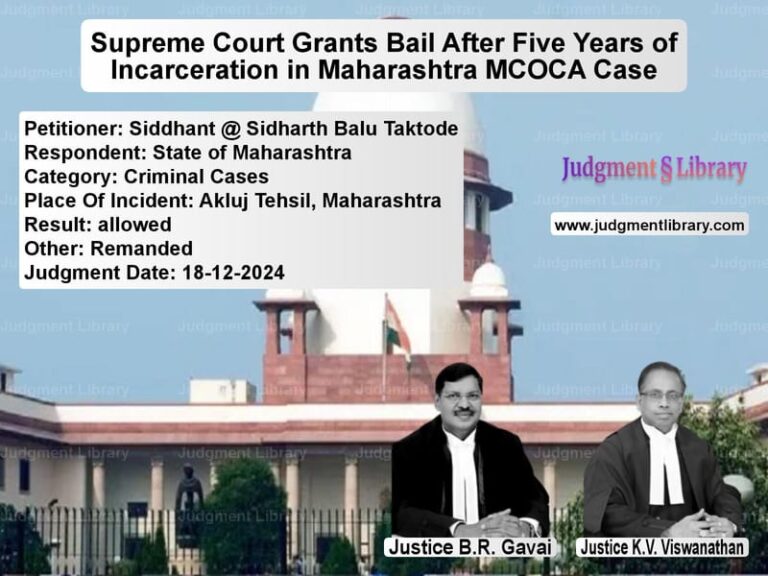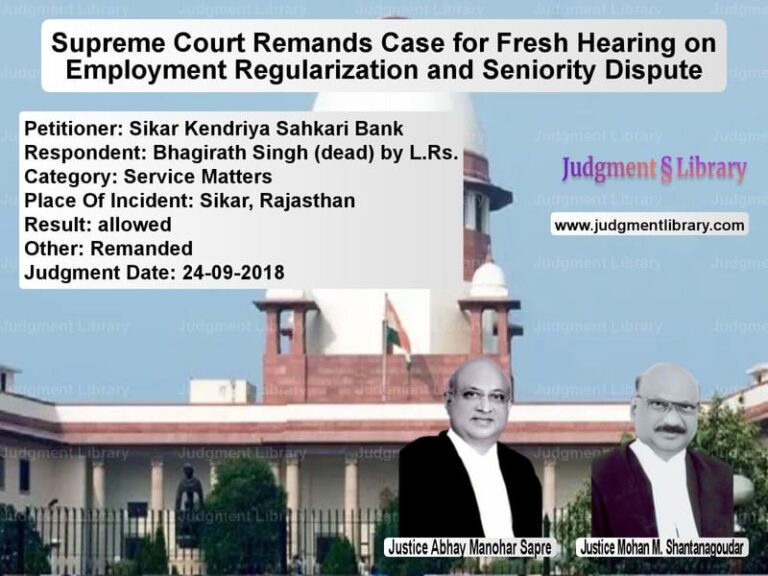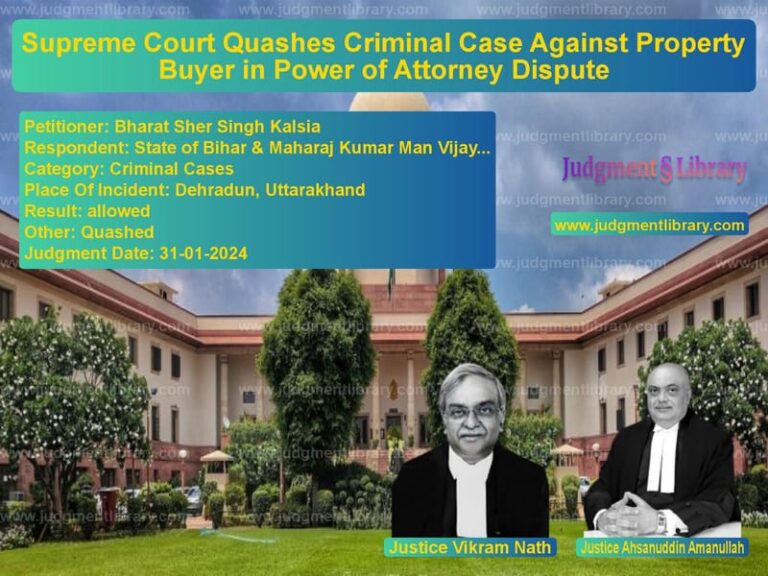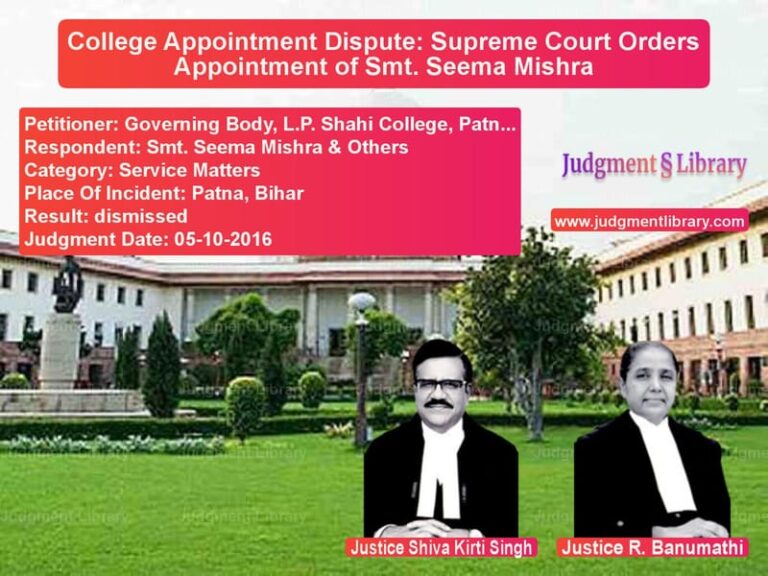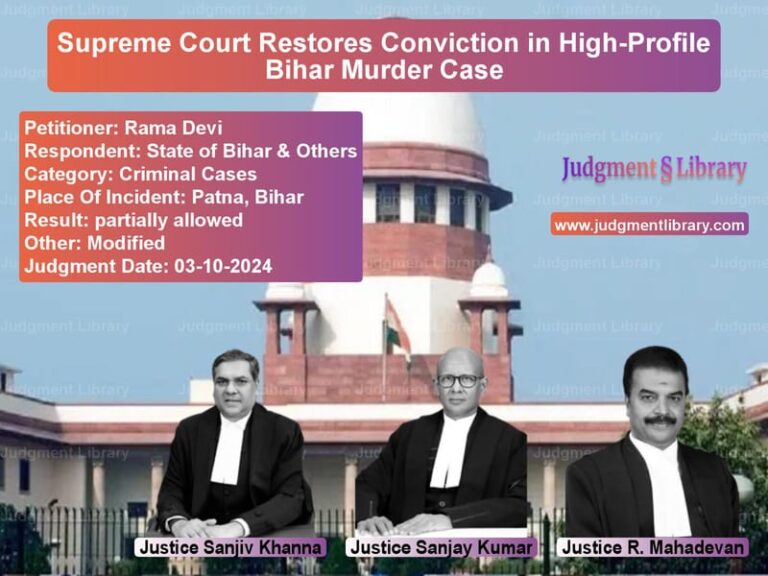Supreme Court Grants Additional Compensation in Railway Land Acquisition Case
The Supreme Court of India has ruled in favor of Subodh Singh, granting additional compensation for delayed payment in a railway land acquisition case. The Court found that the appellant was entitled to compensation for the full period of delay, overturning the Allahabad High Court’s order that directed him to seek arbitration for determining the additional compensation.
Background of the Case
The dispute arose when land in Kakrahi, Tehsil and District Auriya, Uttar Pradesh, was acquired for the Dedicated Freight Corridor Corporation of India under Section 20(E)(1) of the Indian Railways Act, 1989. Notifications were issued on June 10, 2008, and December 16, 2008, and an award was declared on February 8, 2010. However, the appellant’s land was partially left out of the acquisition, leading to multiple rounds of litigation.
In 2010, the appellant challenged the exclusion of his land and secured a favorable order from the Allahabad High Court. The Supreme Court, in a related case on March 30, 2011, ruled that landowners must receive additional compensation for the delay in payment at a minimum rate of 5% per month.
Despite the ruling, the respondents did not compensate the appellant for the entire delay period. Instead, they issued a payment of ₹2,74,56,000 (₹2.74 crores) but calculated additional compensation for only two months, rather than the full 84-month delay.
Key Legal Issues
- Whether the appellant was entitled to additional compensation for the entire period of delay.
- Whether the Allahabad High Court erred in directing the appellant to initiate arbitration instead of enforcing the Supreme Court’s prior ruling.
- Whether the government’s selective application of compensation terms violated the principles of fairness and equality.
Arguments by the Appellant (Subodh Singh)
- The Supreme Court’s 2011 judgment clearly mandated compensation for each month of delay at a minimum rate of 5% per month.
- The government selectively paid additional compensation to other landowners, such as Smt. Kamla Devi & Ors., for a period of 66 months while restricting the appellant’s compensation to only two months.
- The Allahabad High Court misinterpreted the previous Supreme Court order and wrongfully directed the appellant to arbitration, despite clear guidelines on compensation calculation.
Arguments by the Respondents (Union of India & Others)
- The appellant’s claim for additional compensation beyond two months was not supported by any specific court directive.
- The delay in making the award was due to procedural complexities and should not result in excessive financial liability for the government.
- The appellant should have pursued arbitration under Section 20F(1) of the Railways Act rather than seeking enforcement of an earlier Supreme Court order.
Supreme Court’s Observations
A bench comprising Justices Hima Kohli and Ahsanuddin Amanullah analyzed the case and ruled in favor of the appellant, stating:
- The government’s selective application of compensation terms to different landowners was arbitrary and unfair.
- The Allahabad High Court had misinterpreted the Supreme Court’s earlier judgment, which already established the entitlement to additional compensation.
- The appellant was entitled to additional compensation for the full period of 84 months, not just two months.
- There was no need for the appellant to initiate arbitration when the compensation formula had already been determined by the Supreme Court.
The Court quoted its previous ruling:
- “The second proviso to Section 20F(2) requires payment of additional compensation for the delay in making of the award, at the rate of not less than five percent of the value of the award, for each month of delay.”
- “The period of two months referred to by the High Court was only for making the payment, not for limiting additional compensation.”
Final Judgment
- The appeal was allowed, and the Allahabad High Court’s order was set aside.
- The appellant was granted additional compensation at a rate of 5% per month for a total of 84 months.
- The respondents were directed to pay the remaining compensation within eight weeks.
- The appellant was also awarded 7% per annum simple interest on the outstanding amount from the date it became due.
Implications of the Judgment
- The ruling reinforces the principle that landowners must be fairly compensated for government land acquisitions.
- It establishes that courts must ensure uniform application of compensation rules to all affected landowners.
- The judgment discourages arbitrary and selective compensation practices by government agencies.
- It sets a clear precedent on the calculation of additional compensation for delayed land acquisition payments.
Conclusion
The Supreme Court’s decision in Subodh Singh v. Union of India upholds the rights of landowners and ensures fair compensation for government land acquisitions. By enforcing the 5% per month rule for the entire delay period, the ruling strengthens legal protections for individuals affected by delayed compensation payments.
Petitioner Name: Subodh Singh.Respondent Name: Union of India & Others.Judgment By: Justice Hima Kohli, Justice Ahsanuddin Amanullah.Place Of Incident: Auriya, Uttar Pradesh.Judgment Date: 16-05-2024.
Don’t miss out on the full details! Download the complete judgment in PDF format below and gain valuable insights instantly!
Download Judgment: subodh-singh-vs-union-of-india-&-oth-supreme-court-of-india-judgment-dated-16-05-2024.pdf
Directly Download Judgment: Directly download this Judgment
See all petitions in Damages and Compensation
See all petitions in Landlord-Tenant Disputes
See all petitions in Contract Disputes
See all petitions in Specific Performance
See all petitions in Other Cases
See all petitions in Judgment by Hima Kohli
See all petitions in Judgment by Ahsanuddin Amanullah
See all petitions in allowed
See all petitions in Modified
See all petitions in supreme court of India judgments May 2024
See all petitions in 2024 judgments
See all posts in Civil Cases Category
See all allowed petitions in Civil Cases Category
See all Dismissed petitions in Civil Cases Category
See all partially allowed petitions in Civil Cases Category


